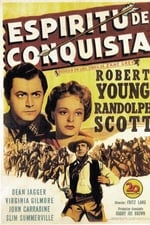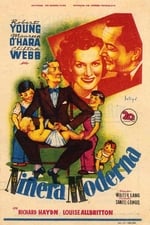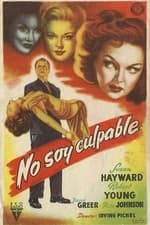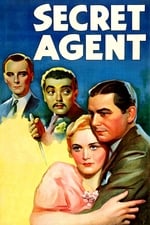Información personal
Conocido por Interpretación
Créditos conocidos 129
Sexo Masculino
Fecha de nacimiento 22 de febrero de 1907
Fecha de defunción 21 de julio de 1998 (91 años)
Lugar de nacimiento Chicago, Illinois, USA
También conocido como
- Robert George Young
- Роберт Янг
Puntuación del contenido
100
¡Sí! ¡Buena pinta!
Iniciar sesión para informar de un problema
Biografía
Robert George Young (February 22, 1907 – July 21, 1998) was an American television, film, and radio actor, best known for his leading roles as Jim Anderson, the father of Father Knows Best (NBC and then CBS) and as physician Marcus Welby in Marcus Welby, M.D. (ABC).
Young appeared in over 100 films between 1931 and 1952. After appearing on stage, Young was signed with Metro-Goldwyn-Mayer and, in spite of having a "tier B" status, he co-starred with some of the studio's most illustrious actresses, such as Katharine Hepburn, Margaret Sullavan, Norma Shearer, Joan Crawford, Helen Hayes, Luise Rainer, Hedy Lamarr, and Helen Twelvetrees. Yet, most of his assignments consisted of B movies, also known as "programmers," which required two to three weeks of shooting (considered very brief shooting periods at the time). Actors who were relegated to such a hectic schedule appeared, as Young did, in some six to eight movies per year.
As an MGM contract player, Young was resigned to the fate of most of his colleagues—to accept any film assigned to him or risk being placed on suspension—and many actors on suspension were prohibited from earning a salary from any endeavor at all (even those unrelated to the film industry). In 1936, MGM summarily loaned Young to Gaumont British for two films; the first was directed by Alfred Hitchcock with the other co-starring Jessie Matthews. While there he surmised that his employers intended to terminate his contract, but he was mistaken.
He unexpectedly received one of his most rewarding roles late in his MGM career, in H.M. Pulham, Esq., featuring one of Hedy Lamarr's most effective performances. He once remarked that he was assigned only those roles which Robert Montgomery and other A-list actors had rejected.
After his contract ended at MGM, Young starred in light comedies as well as in trenchant dramas for studios such as 20th Century Fox, United Artists, and RKO Radio Pictures. From 1943, Young assayed more challenging roles in films like Claudia, The Enchanted Cottage, They Won't Believe Me, The Second Woman, and Crossfire. His portrayal of unsympathetic characters in several of these later films—which was seldom the case in his MGM pictures—was applauded by numerous reviewers.
Young's career began an incremental and imperceptible decline, despite a propitious beginning as a freelance actor without the nurturing of a major studio. He continued starring as a leading man in the late 1940s and early 1950s, but only in mediocre films, then he subsequently disappeared from the silver screen - only to reappear several years later on a much smaller one.
Description above from the Wikipedia article Robert Young (actor), licensed under CC-BY-SA, full list of contributors on Wikipedia
Robert George Young (February 22, 1907 – July 21, 1998) was an American television, film, and radio actor, best known for his leading roles as Jim Anderson, the father of Father Knows Best (NBC and then CBS) and as physician Marcus Welby in Marcus Welby, M.D. (ABC).
Young appeared in over 100 films between 1931 and 1952. After appearing on stage, Young was signed with Metro-Goldwyn-Mayer and, in spite of having a "tier B" status, he co-starred with some of the studio's most illustrious actresses, such as Katharine Hepburn, Margaret Sullavan, Norma Shearer, Joan Crawford, Helen Hayes, Luise Rainer, Hedy Lamarr, and Helen Twelvetrees. Yet, most of his assignments consisted of B movies, also known as "programmers," which required two to three weeks of shooting (considered very brief shooting periods at the time). Actors who were relegated to such a hectic schedule appeared, as Young did, in some six to eight movies per year.
As an MGM contract player, Young was resigned to the fate of most of his colleagues—to accept any film assigned to him or risk being placed on suspension—and many actors on suspension were prohibited from earning a salary from any endeavor at all (even those unrelated to the film industry). In 1936, MGM summarily loaned Young to Gaumont British for two films; the first was directed by Alfred Hitchcock with the other co-starring Jessie Matthews. While there he surmised that his employers intended to terminate his contract, but he was mistaken.
He unexpectedly received one of his most rewarding roles late in his MGM career, in H.M. Pulham, Esq., featuring one of Hedy Lamarr's most effective performances. He once remarked that he was assigned only those roles which Robert Montgomery and other A-list actors had rejected.
After his contract ended at MGM, Young starred in light comedies as well as in trenchant dramas for studios such as 20th Century Fox, United Artists, and RKO Radio Pictures. From 1943, Young assayed more challenging roles in films like Claudia, The Enchanted Cottage, They Won't Believe Me, The Second Woman, and Crossfire. His portrayal of unsympathetic characters in several of these later films—which was seldom the case in his MGM pictures—was applauded by numerous reviewers.
Young's career began an incremental and imperceptible decline, despite a propitious beginning as a freelance actor without the nurturing of a major studio. He continued starring as a leading man in the late 1940s and early 1950s, but only in mediocre films, then he subsequently disappeared from the silver screen - only to reappear several years later on a much smaller one.
Description above from the Wikipedia article Robert Young (actor), licensed under CC-BY-SA, full list of contributors on Wikipedia
Interpretación
|
|||||||||||||||||||||||||||
|
|||||||||||||||||||||||||||
|
|||||||||||||||||||||||||||
|
|||||||||||||||||||||||||||
|
|||||||||||||||||||||||||||
|
|||||||||||||||||||||||||||
|
|||||||||||||||||||||||||||
|
|||||||||||||||||||||||||||
|
|||||||||||||||||||||||||||
|
|||||||||||||||||||||||||||
|
|||||||||||||||||||||||||||
|
|||||||||||||||||||||||||||
|
|||||||||||||||||||||||||||
|
|||||||||||||||||||||||||||
|
|||||||||||||||||||||||||||
|
|||||||||||||||||||||||||||
|
|||||||||||||||||||||||||||
|
|||||||||||||||||||||||||||
|
|||||||||||||||||||||||||||
|
|||||||||||||||||||||||||||
|
|||||||||||||||||||||||||||
|
|||||||||||||||||||||||||||
|
|||||||||||||||||||||||||||
|
|||||||||||||||||||||||||||
|
|||||||||||||||||||||||||||
|
|||||||||||||||||||||||||||
|
|||||||||||||||||||||||||||
|
|||||||||||||||||||||||||||
|
|||||||||||||||||||||||||||
|
|||||||||||||||||||||||||||
|
|||||||||||||||||||||||||||
|
|||||||||||||||||||||||||||
|
|||||||||||||||||||||||||||
|
|||||||||||||||||||||||||||
|
|||||||||||||||||||||||||||
|
|||||||||||||||||||||||||||
|
|||||||||||||||||||||||||||
|
|||||||||||||||||||||||||||
|
|||||||||||||||||||||||||||
|
|||||||||||||||||||||||||||
|
|||||||||||||||||||||||||||
|
|||||||||||||||||||||||||||
|
|||||||||||||||||||||||||||
|








